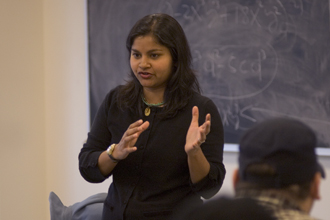
Does the quest for true love conflict with traditional values? Does assimilation into American culture threaten one’s native cultural-identity? These are the kinds of questions Rifat A. Salam, professor of sociology, likes to pose.
In honor of Asian History month, Salam will be conducting a panel discussion called “The Asian American Experience.” (April 27, room M1106, 2 pm-3:15 pm), focusing on both the stereotypes and realities of marriage as they relate to Asian-Americans.
More specifically, Salam is interested in the love lives of second-generation South Asian-Americans. She’s currently finishing up her dissertation, which focuses on this ethnic group, mainly through the lens of marriage and dating.
“I was always interested in the idea of ethnic loyalty to family within the dominant culture,” Salam says. “There are so many myths about second generation South Asians and arranged marriages. I wanted to look at the reality.”
Salam contends that stereotypes about arranged marriage in this ethnic group are often just that–stereotypes and nothing more. There are other assumptions as well.
“It’s assumed that we’re all academically successful, career oriented, and we work in conservative fields,” explains Salam. “It’s also assumed that we don’t look to fully assimilate into the mainstream culture.”
According to Salam, the way people seek their mate determines their degree of assimilation into American society. Often, however, it’s only a matter of perception.
“Marrying outside the group is the most rebellious form of assimilation for this particular ethnic group,” asserts Salam. But it’s not so much that Salam questions whether or not arranged marriages exist in the second generation group of South Asians. She’s more interested in how and why the custom is perceived so differently from the way other ethnic groups in America date within their own population pools.
“How is ‘J-dating’ so different from South Asians intermarrying?” she asks rhetorically, using the Jewish dating model as her example. “And why are we considered less American if we choose to marry within our group? The assumption that we are not assimilated has more to do with preconceived notions about arranged marriages.”
Class seems to play the largest role in determining whether or not young Southeast Asians will choose to follow tradition or break away and marry outside their ethnic group.
“A woman who is a doctor will usually want the equivalent in a mate, professionally and academically,” explains Salam. “And that sort of thing matters far more than any other factor. But it’s also interesting that a woman’s looks play a far larger role in determining her marital worth in an American context, if she isn’t particularly educated.”
The ideology of romantic love is not usually a determining factor in arranged marriages because the practicing cultures claim that love grows over time. But the reality is that the American norm–the Hollywood ideas of love and companionship, coupled with sexual attraction and personal fulfillment–is desired by most Americans, regardless of their ethnic background.
Salam’s findings show that second generation South Asians have more choices and autonomy in the American context of arranged marriages, making this traditional path to wedlock not entirely mutually exclusive of the romantic-love model for marriage. Below are Professor Salam’s groupings to demonstrate how second generation South Asians differ in their dating and mating habits.
The New Traditionalists
According to the ‘old tradition’ the couple should not meet before the wedding day. Religious and conservative families are the only ones who tend to be this strict about the rule, especially in the American context. The Internet, for one thing, has helped speed along the dating process while eradicating the absolute anonymity of pairing up.
The Open-Minded
The people who fall into this category are open to whatever options are available to them for marriage. They are not particular about which ethnic group their mate comes from. The main goal is to find the perfect mate, regardless of race or religion. This group most closely adheres to the romantic love ideology.
The Ethnic Rebels
Ethnic Rebels go beyond open-mindedness because they have political and/or philosophical issues with the social models available to them. They are often political in their assessment of the world and want to redefine their options by making it a point to push the boundaries of what their community believes is the right way to live their lives. Not only does the ethnic rebel often date outside his/her own race or religion, homosexuals and transsexuals are most often found in this group.

